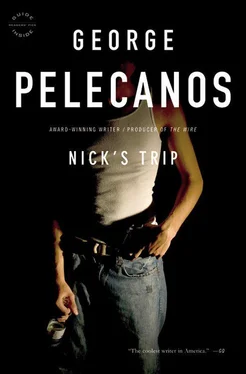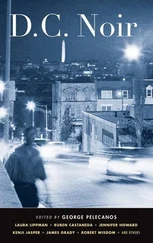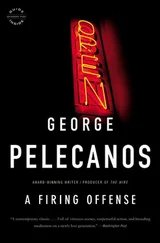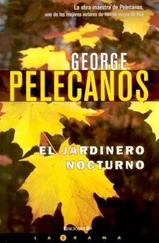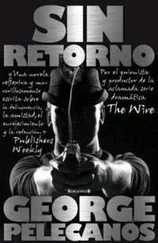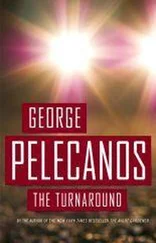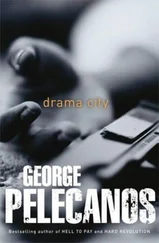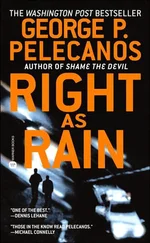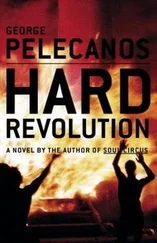George Pelecanos - Nick's trip
Здесь есть возможность читать онлайн «George Pelecanos - Nick's trip» весь текст электронной книги совершенно бесплатно (целиком полную версию без сокращений). В некоторых случаях можно слушать аудио, скачать через торрент в формате fb2 и присутствует краткое содержание. Жанр: Криминальный детектив, на английском языке. Описание произведения, (предисловие) а так же отзывы посетителей доступны на портале библиотеки ЛибКат.
- Название:Nick's trip
- Автор:
- Жанр:
- Год:неизвестен
- ISBN:нет данных
- Рейтинг книги:3 / 5. Голосов: 1
-
Избранное:Добавить в избранное
- Отзывы:
-
Ваша оценка:
- 60
- 1
- 2
- 3
- 4
- 5
Nick's trip: краткое содержание, описание и аннотация
Предлагаем к чтению аннотацию, описание, краткое содержание или предисловие (зависит от того, что написал сам автор книги «Nick's trip»). Если вы не нашли необходимую информацию о книге — напишите в комментариях, мы постараемся отыскать её.
Nick's trip — читать онлайн бесплатно полную книгу (весь текст) целиком
Ниже представлен текст книги, разбитый по страницам. Система сохранения места последней прочитанной страницы, позволяет с удобством читать онлайн бесплатно книгу «Nick's trip», без необходимости каждый раз заново искать на чём Вы остановились. Поставьте закладку, и сможете в любой момент перейти на страницу, на которой закончили чтение.
Интервал:
Закладка:
George Pelecanos
Nick's trip
ONE
The night Billy Goodrich walked in I was tending bar at a place called the Spot, a bunker of painted cinder block and forty-watt bulbs at the northwest corner of Eighth and G in Southeast. The common wisdom holds that there are no neighborhood joints left in D.C., places where a man can get lost and smoke cigarettes down to the filter and drink beer backed with whiskey. The truth is you have to know where to find them. Where you can find them is down by the river, near the barracks and east of the Hill.
An Arctic wind had dropped into town that evening with the suddenness of a distaff emotion, transforming a chilly December rain into soft, wet snow. At first flake’s notice most of my patrons had bolted out of the warped and rotting door of the Spot, and now, as the snow began to freeze and cover the cold black streets, only a few hard drinkers remained.
One of them, a gin-drenched gentleman by the name of Melvin, sat directly in front of me at the bar. Melvin squinted and attempted to read the titles of the cassettes behind my back. I wiped my hands lethargically on a blue rag that hung from the side of my trousers, and waited with great patience for Melvin to choose the evening’s next musical selection.
Melvin said, “Put on some Barry.”
I nodded and began to fumble through the stack of loose cassettes that were randomly scattered near the lowest row of call. The one I was looking for was close to the bottom, and its plastic casing was stained green with Rose’s lime. It was Barry White’s first recording, “I›
“This the one, Mel?” I palmed it in front of his face. Mel nodded as I slipped the tape in and touched the PLAY button.
Mel said, “Let me tell you somethin’ ’bout my boy Barry. You done been on a bad trip with your girlfriend-you put on Barry. Barry be talkin’ real pretty and shit, all of a sudden you sayin’, ‘I learned, baby. I sweeeear I learned.’” The bass of the Barrance came through the grilleless Realistic speakers, and Mel sensually joined in: “Don’t do that. Baby, pleeease don’t do that.”
Melvin Jeffers had just sunk his fifth rail martini. He had begun to sing and in all probability would continue to sing for the remainder of the night. I eyed my options down the bar.
Buddy and Bubba were in place at the far right corner, seated next to the Redskins schedule that was taped to the wall, the one with the placekicker booting the pigskin through goalposts shaped suspiciously like long-necked bottles of Bud. Buddy was short and cubically muscular with an angular face and white blond hair. Like many men who took up body building for the wrong reason, he had found to his dismay that having a pumped-up physique did nothing to diminish the huge chip that was on his shoulder. His friend Bubba also considered himself to be an athlete but was simply broad-shouldered and fat. Bubba had the pink, rubbery face that some unlucky alcoholics get and then keep after their thirtieth birthday.
I moved down the bar, picked up Buddy’s mug, and with my raised brow asked him if he wanted another. Buddy shook his head and made sure I saw him look me over. I turned my attention to Bubba.
“How ’bout you, Bubber?” I asked in my best whiny, mid-sixties Brando. “You want one?”
Bubba said, “Uh-uh,” then looked at his friend inquisitively, something he did every time I addressed him in this manner. In The Chase, a film that barely contained one of Marlon Brando’s most eccentric performances, the legendary actor continually mispronounced the name of Bubba, Robert Redford’s character, as “Bubber.” It was a film that the Spot’s Bubba had obviously missed.
I left them and, as I passed, avoided eye contact with the only remaining customer, a cop named Boyle. Buddy and Bubba were one thing, rednecks wearing ties, but I was in no mood to open that particularly poisonous, psychotic can of worms named Dan Boyle.
Instead I turned my back on all of them and began to wipe down the bottles on the call rack. I caught a sliver of my reflection in the bar mirror between liters of Captain Morgan’s and Bacardi Dark, then looked away.
Almost a year had passed since I had taken my first case, a disaster that had ended with a close friend being numbered among the dead. I emerged relatively unscathed but had caught a glimpse of my mortality and, more startling than that, a fairly obvious map for the remainder of the trip. I had three grand in the bank and a District of Columbia private investigator’s license in my wallet. In my license photograph I sported a blue-black shiner below my left edivow my lye, a trophy I had earned in a Eurotrash disco while on a particularly ugly binge. Clearly I was on my way.
Though my tenure in retail electronics was over (I had made the poor career move of staging a gunfight in my former employer’s warehouse), I began the year with energy. I made the yellow pages deadline, listing myself as “Nicholas J. Stefanos, Investigator,” even stepping up for the boldfaced type. I bought a used pair of binoculars and a long-lensed Pentax, printed report forms and business cards, and hooked myself up with an answering service. Then I sat back and waited for the cases to roll in.
When they didn’t, I began to take long, daily walks through D.C. I visited galleries and museums, spending more than one afternoon studying the large paintings of Jack Dempsey and Joe Louis in the National Portrait Gallery at Eighth and F. Several times on these visits I was followed through the cavernous halls by suspicious security guards, something I attributed to their boredom and to my progressively hangdog appearance. When I had exhausted the museums, I went to the Martin Luther King Jr. Memorial Library and renewed my card, then spent the next week in the Washingtoniana Room on the third floor, mainly in the company of street people who slept silently at the various tables with newspapers wedged in their hands. In that week I read most of the Washington Star ’s morgue material printed between 1958 and 1961, in an effort to get a feel for those years of my life of which I had no recollection. I then discovered the European reading room at the Library of Congress and read modern history for two weeks in a row, sitting across from an ultrawhite eunuch who wore a bow tie every day and never once looked in my direction. One day I walked the pale yellow tunnel from the Jefferson Building to the Madison Building and stumbled upon the Motion Picture and Television Reading Room on the third floor. I spent the month of March in that room, reading everything from scholarly works on the spaghetti western to Andre Bazin to something called A Cinema of Loneliness by a guy named Kolker. Though the room was reserved for professionals, no one questioned my presence or bothered me in any way. In fact, no one spoke to me at all. Spring came and I began to haunt the parks and gardens of the city, returning with frequency to the Bishop’s Garden at the National Cathedral. Some days I would walk through cemeteries finding them a curious combination of the enigmatic and the starkly real. The Rock Creek Cemetery, with its Adams Monuments, was a particular favorite.
Sometime in May I was suddenly overcome with the natural feeling that it was time to “do” something. The next morning I tied my first Windsor knot in five months and rode the Metro to Gallery Place, where I walked to the offices of Bartell Investigative Services on Eighth at H, located smack in the middle of Chinatown.
I had picked them out of the phone book at random, preferring to work in that section of town, and was surprised upon entering and filling out an application that they would interview me on the spot. But as I stood in a reception area at the front of the office, I studied the other operatives at their desks, beefy guys in tight gray suits with prison haircuts who had the appearance of aging high school linemen, and decided it wasn’t for me. I stuffed the application in my breast pocket, thanked the nicotine-throated grandmother type at the desk, and walked out into the street.
Читать дальшеИнтервал:
Закладка:
Похожие книги на «Nick's trip»
Представляем Вашему вниманию похожие книги на «Nick's trip» списком для выбора. Мы отобрали схожую по названию и смыслу литературу в надежде предоставить читателям больше вариантов отыскать новые, интересные, ещё непрочитанные произведения.
Обсуждение, отзывы о книге «Nick's trip» и просто собственные мнения читателей. Оставьте ваши комментарии, напишите, что Вы думаете о произведении, его смысле или главных героях. Укажите что конкретно понравилось, а что нет, и почему Вы так считаете.
